Yaolun Zhang
Live-Evo: Online Evolution of Agentic Memory from Continuous Feedback
Feb 02, 2026Abstract:Large language model (LLM) agents are increasingly equipped with memory, which are stored experience and reusable guidance that can improve task-solving performance. Recent \emph{self-evolving} systems update memory based on interaction outcomes, but most existing evolution pipelines are developed for static train/test splits and only approximate online learning by folding static benchmarks, making them brittle under true distribution shift and continuous feedback. We introduce \textsc{Live-Evo}, an online self-evolving memory system that learns from a stream of incoming data over time. \textsc{Live-Evo} decouples \emph{what happened} from \emph{how to use it} via an Experience Bank and a Meta-Guideline Bank, compiling task-adaptive guidelines from retrieved experiences for each task. To manage memory online, \textsc{Live-Evo} maintains experience weights and updates them from feedback: experiences that consistently help are reinforced and retrieved more often, while misleading or stale experiences are down-weighted and gradually forgotten, analogous to reinforcement and decay in human memory. On the live \textit{Prophet Arena} benchmark over a 10-week horizon, \textsc{Live-Evo} improves Brier score by 20.8\% and increases market returns by 12.9\%, while also transferring to deep-research benchmarks with consistent gains over strong baselines. Our code is available at https://github.com/ag2ai/Live-Evo.
ELV-Halluc: Benchmarking Semantic Aggregation Hallucinations in Long Video Understanding
Aug 29, 2025
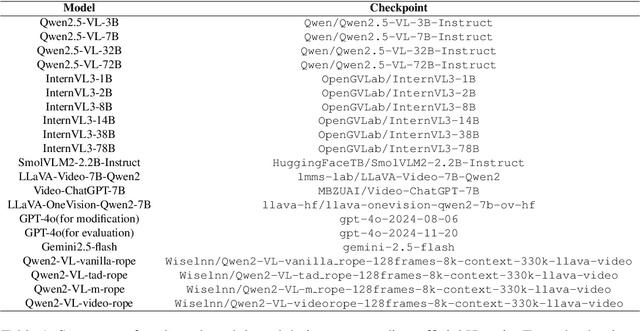
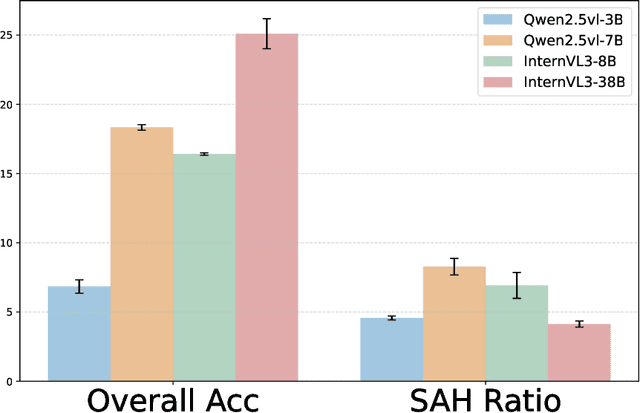
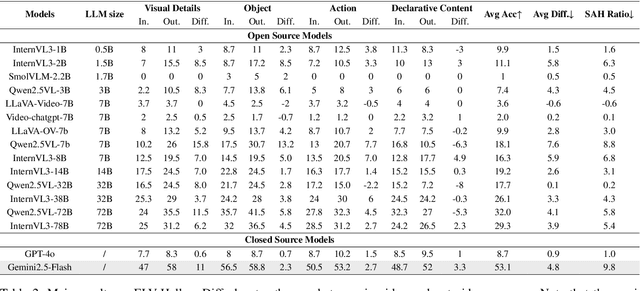
Abstract:Video multimodal large language models (Video-MLLMs) have achieved remarkable progress in video understanding. However, they remain vulnerable to hallucination-producing content inconsistent with or unrelated to video inputs. Previous video hallucination benchmarks primarily focus on short-videos. They attribute hallucinations to factors such as strong language priors, missing frames, or vision-language biases introduced by the visual encoder. While these causes indeed account for most hallucinations in short videos, they still oversimplify the cause of hallucinations. Sometimes, models generate incorrect outputs but with correct frame-level semantics. We refer to this type of hallucination as Semantic Aggregation Hallucination (SAH), which arises during the process of aggregating frame-level semantics into event-level semantic groups. Given that SAH becomes particularly critical in long videos due to increased semantic complexity across multiple events, it is essential to separate and thoroughly investigate the causes of this type of hallucination. To address the above issues, we introduce ELV-Halluc, the first benchmark dedicated to long-video hallucination, enabling a systematic investigation of SAH. Our experiments confirm the existence of SAH and show that it increases with semantic complexity. Additionally, we find that models are more prone to SAH on rapidly changing semantics. Moreover, we discuss potential approaches to mitigate SAH. We demonstrate that positional encoding strategy contributes to alleviating SAH, and further adopt DPO strategy to enhance the model's ability to distinguish semantics within and across events. To support this, we curate a dataset of 8K adversarial data pairs and achieve improvements on both ELV-Halluc and Video-MME, including a substantial 27.7% reduction in SAH ratio.
MetaAgent: Automatically Constructing Multi-Agent Systems Based on Finite State Machines
Jul 30, 2025Abstract:Large Language Models (LLMs) have demonstrated the ability to solve a wide range of practical tasks within multi-agent systems. However, existing human-designed multi-agent frameworks are typically limited to a small set of pre-defined scenarios, while current automated design methods suffer from several limitations, such as the lack of tool integration, dependence on external training data, and rigid communication structures. In this paper, we propose MetaAgent, a finite state machine based framework that can automatically generate a multi-agent system. Given a task description, MetaAgent will design a multi-agent system and polish it through an optimization algorithm. When the multi-agent system is deployed, the finite state machine will control the agent's actions and the state transitions. To evaluate our framework, we conduct experiments on both text-based tasks and practical tasks. The results indicate that the generated multi-agent system surpasses other auto-designed methods and can achieve a comparable performance with the human-designed multi-agent system, which is optimized for those specific tasks.
PyBench: Evaluating LLM Agent on various real-world coding tasks
Jul 23, 2024



Abstract:The LLM Agent, equipped with a code interpreter, is capable of automatically solving real-world coding tasks, such as data analysis and image editing. However, existing benchmarks primarily focus on either simplistic tasks, such as completing a few lines of code, or on extremely complex and specific tasks at the repository level, neither of which are representative of various daily coding tasks. To address this gap, we introduce \textbf{PyBench}, a benchmark encompassing five main categories of real-world tasks, covering more than 10 types of files. Given a high-level user query and related files, the LLM Agent needs to reason and execute Python code via a code interpreter for a few turns before making a formal response to fulfill the user's requirements. Successfully addressing tasks in PyBench demands a robust understanding of various Python packages, superior reasoning capabilities, and the ability to incorporate feedback from executed code. Our evaluations indicate that current open-source LLMs are struggling with these tasks. Hence, we conduct analysis and experiments on four kinds of datasets proving that comprehensive abilities are needed for PyBench. Our fine-tuned 8B size model: \textbf{PyLlama3} achieves an exciting performance on PyBench which surpasses many 33B and 70B size models. Our Benchmark, Training Dataset, and Model are available at: \href{https://github.com/Mercury7353/PyBench}{https://github.com/Mercury7353/PyBench}
Depending on yourself when you should: Mentoring LLM with RL agents to become the master in cybersecurity games
Mar 26, 2024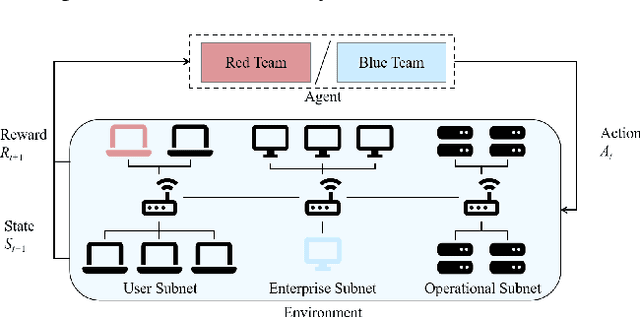

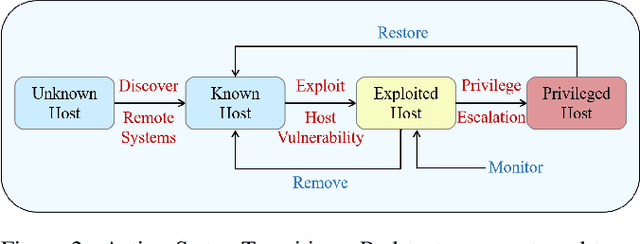
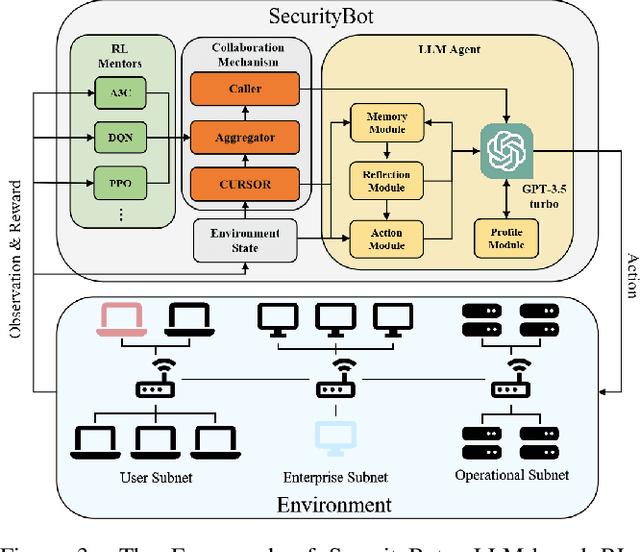
Abstract:Integrating LLM and reinforcement learning (RL) agent effectively to achieve complementary performance is critical in high stake tasks like cybersecurity operations. In this study, we introduce SecurityBot, a LLM agent mentored by pre-trained RL agents, to support cybersecurity operations. In particularly, the LLM agent is supported with a profile module to generated behavior guidelines, a memory module to accumulate local experiences, a reflection module to re-evaluate choices, and an action module to reduce action space. Additionally, it adopts the collaboration mechanism to take suggestions from pre-trained RL agents, including a cursor for dynamic suggestion taken, an aggregator for multiple mentors' suggestions ranking and a caller for proactive suggestion asking. Building on the CybORG experiment framework, our experiences show that SecurityBot demonstrates significant performance improvement compared with LLM or RL standalone, achieving the complementary performance in the cybersecurity games.
 Add to Chrome
Add to Chrome Add to Firefox
Add to Firefox Add to Edge
Add to Edge